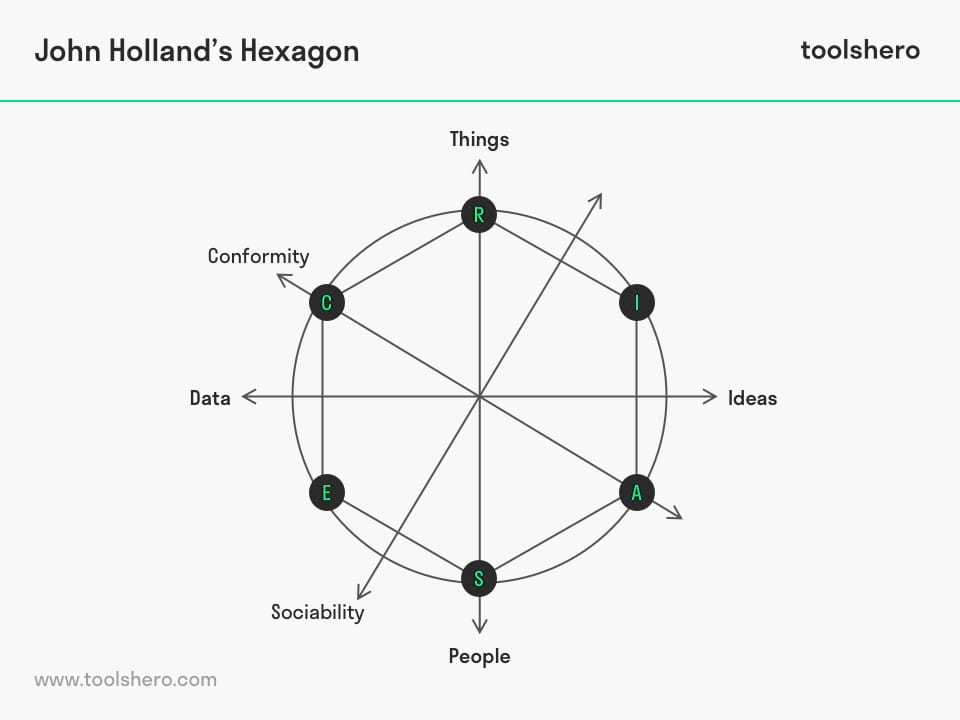Self Directed Search Assessment (Holland)

Self Directed Search Assessment: this article provides a practical explanation of Self Directed Search Asessment, developed by John Holland. Next to what it is (the theory), this article also highlights John Holland’s Hexagon assessment, the RIASEC types of the Self Directed Search and the benefits of this career assessment. Enjoy reading!
What is the Self Directed Search Assessment by John Holland? The theory
Self Directed Search (SDS) by John Holland is a career and interests test that is designed specifically to have the user think about questions concerning personal ambition, skills, activities, and interests in various positions.
Self Directed Search (SDS) is based on the theory of American psychologist John Holland, in which work environments and individuals are divided into six categories. The categories are realistic, investigative, artistic, social, enterprising, and conventional. These types are abbreviated with the acronym RIASEC.
Artistic personalities usually perform well in creative positions, while realists thrive better in a work environment that applies tools and machines.
Personalities focused on conventionality more often look for detail-oriented careers such as in the financial sector. Social personality types more often look for positions that involve interaction with others. The enterprising personalities look for a career in which they can lead and sell.
The assessment itself
The Self Directed Search Assessment for career planning is the most frequently used method for discovering career interests. Many educational institutes like high schools or universities have their students take the test as a educational opportunities finder, but the test can also be used for working adults as an occupations finder.
SDS is easy to use and is usually completed in 35 to 45 minutes, either digitally or by paper and pencil and an assessment booklet. The test is relatively cheap and the results are sent online in an interpretive report in pdf format. The SDS form produces a few letter summary code, which can be used to look up the occupations finder online.
John Holland’s Hexagon, the assessment explained
John Holland developed a hexagon, a model with six corners, that shows the relationship between different types of personality and the suitable work environment. In the hexagon, it seems like the personality types that lie far from each other differ strongly from each other, and the personality types that are close together share more characteristics.
This is clearest when personalities that are opposite each other are compared, even though these personalities may share some characteristics. The same principle holds when comparing work environments.

Figure 1 – John Holland’s Hexagon Example – Self Directed Search
Self Directed Search Assessment: RIASEC types
Based on his research, John Holland determined six personality types. These are explained below. For each type examples are offered of fitting careers and what other types they need to intersect with for a position in those careers.
Realistic (doers)
The doers are people who like working with objects and implement ideas. They usually have an assertive predisposition, are competitive, and are interested in activities that require a high level of motor coordination, skill, or power.
Doers have good problem solving skills and tackle a problem rather than talking or thinking about it. In doing so, they prefer a concrete approach rather than abstract theories or ideas.
- Surgeon (+ characteristics of investigative and social)
- Fireman or -woman (+ characteristics of social and enterprising)
- Engineer (+ characteristics of investigative and conventional)
- Dentist (+ characteristics of investigative and social)
- Architect (+ characteristics of artistic and enterprising)
Investigative (thinkers)
The second group of personalities in the theory behind Self-Directed Search (SDS) by John Holland are the thinkers. These people like to work with data and love thinking and observing.
On average, this group contains many people with strong skills in maths and sciences, and few people with leadership qualities. Thinkers have an analytical predisposition, and are careful, curious, and independent.
- Doctor (+ characteristics of social)
- Lawyer (+ characteristics of enterprising and social)
- Psychologist (+ characteristics of social and artistic)
- Internet developer (+ characteristics of conventional, realistic, and artistic)
- Carpenter (+ characteristics of conventional and realistic)
Artistic (creators)
This group of people likes to develop ideas, and are creative, open, inventive, and original. The creators are more emotional than others and are described as complicated, imaginative, expressive, and idealistic. In general, this type likes jobs such as composer, musician, or writer.
- Journalist (+ characteristics of enterprising)
- Entrepreneur (+ characteristics of social and enterprising)
- Graphic designer (+ characteristics of enterprising and realistic)
- Public relations (+ characteristics of enterprising)
- Teacher (+ characteristics of social)
Social (helpers)
The fourth group of personalities in the theory behind Self Directed Search (SDS) by John Holland are people who like to work with other people, and who gain energy from helping or teaching others.
Helpers feel attracted to people they have a close relationship with, and are less inclined to want to excel intellectually or physically. This type of personality enjoys positions in education, religion, psychologist, or occupational therapist.
Characteristics of helpers include friendly, generous, responsible, understanding, and warm.
- Entrepreneur (+ characteristics of enterprising and artistic)
- Lawyer (+ characteristics of investigative and enterprising)
- Diplomat (+ characteristics of enterprising and artistic)
- Customer services (+ characteristics of conventional and enterprising)
- Trainer (+ characteristics of artistic and conventional)
- Veterinarian (+ characteristics of investigative and realistic)
Enterprising (seducers)
The seducers are personalities who want to work with people and data. Seducers are generally good talkers, and they know how to apply these skills in order to convince or lead others.
They value reputation, money, status, and power. Seducers have good leadership qualities, but they generally lack scientific aptitude. Characteristics to describe this type are adventurous, ambitious, impulsive, confident, and optimistic.
- Architect (+ characteristics of investigative and conventional)
- Business person (+ characteristics of social and conventional)
- Entrepreneur (+ characteristics of social and artistic)
- HR manager (+ characteristics of conventional and social)
- Journalist (+ characteristics of artistic)
Conventional (organisers)
This personality type from the theory behind the Self-Directed Search (SDS) concerns people who like to work with data, regulations, rules, and procedures. The organisers love structure and order, they get nervous in unstructured and unclear situations, both at work and in their private life. Organisers also value reputation, power, and status.
Organisers often have strong mathematical ability, but lack artistic skills. Characteristics for organisers are precision, efficiency, obedient, practical, and orderly.
- Accountant (+ characteristics of enterprising)
- Carpenter (+ characteristics of realistic and investigative)
- Engineer (+ characteristics of investigative and realistic)
- Maths teacher (+ characteristics of social)
- Pharmacist (+ characteristics of social and investigative)
- Internet developer (+ characteristics of artistic, realistic, and investigative)
Who is the Self Directed Search Assessment meant for?
It often happens that people aren’t following their own interests in the work they do. Over time, this may cause demotivation and unhappiness with work life.
The Self Directed Search (SDS) offers everyone the opportunity to discover their own interests, to connect these to work environments, and select the perfect work environment this way.
Students
Students are expected to make a choice about their career at a young age. However, students especially develop during this time, and it may occur that they later realise that they aren’t really interested in a certain field after all.
It’s therefore important that high-school students take this test, in order to then select the right education so there is a good chance the students will end up working in a work environment that’s compatible with their personality type.
Pensioners
After having worked for a large part of their lives, the elderly and pensioners also discover new or ignored interests at a later age.
A part of this group of people does not want to fully stop working, or wants to do other activities like volunteer work. For them, the Self Directed Search (SDS) is a good way to discover new interests.
Working professionals
Some people like change more than others. Sometimes a career change is voluntary, and sometimes there’s no other choice.
It may occur that a working professional discovers that what he or she is doing doesn’t correspond with their own interests. It requires courage, but a career change to a position with more intersections with the own interests will have positive results.
Veterans
The transition to civilian life is a challenge for many soldiers. Soldiers have often not participated in social society for a long time and they have to find their feet again, so to speak.
They’re in the same position as students, who also don’t know what fits them, with regards to knowledge about their own interests. This test therefore offers veterans and other people who re-enter society a framework for identifying interests, and to find a suitable job based on that.
Benefits of the Self Directed Search Assessment
The use of John Holland’s interests test offers several benefits over other interest and career tests.
- The test can be made independently
- The test can be assessed independently
- The test is interpreted independently
- The individual summary (advice) is connected to a network of over 1,400 different careers
- The online career database is continuously updated
Now It’s Your Turn
What do you think? Is the explanation about Self Directed Search (SDS) by John Holland familiar? Do you recognise which personality type matches your personality? And are you in the right career according to the hexagon? Will you recommend this test and knowledge to others? Do you have any tips or additional comments?
Share your experience and knowledge in the comments box below.
More information
- Fuller, B. E., Holland, J. L., & Johnston, J. A. (1999). The relation of profile elevation in the Self-Directed Search to personality variables. Journal of Career Assessment, 7(2), 111-123.
- Holland, J. L., Fritzsche, B. A., & Powell, A. B. (1985). SDS, Self-directed Search. Psychological Assessment Resources.
- Holland, J. L., & Gottfredson, G. D. (1976). Sex differences, item revisions, validity, and the Self-Directed Search. Measurement and evaluation in guidance, 8(4), 224-228.
- Spokane, A. R., & Holland, J. L. (1995). The Self-Directed Search: A family of self-guided career interventions. Journal of Career Assessment, 3(4), 373-390.
How to cite this article:
Janse, B. (2019). Self Directed Search Assessment (Holland). Retrieved [insert date] from Toolshero: https://www.toolshero.com/human-resources/self-directed-search/
Published on: 12/21/2019 | Last update: 02/25/2023
Add a link to this page on your website:
<a href=”https://www.toolshero.com/human-resources/self-directed-search/”>Toolshero: Self Directed Search Assessment (Holland)</a>













2 responses to “Self Directed Search Assessment (Holland)”
thank you
Thank you, I mean so muchhh. This article help me to finish my final-exam-project from my college